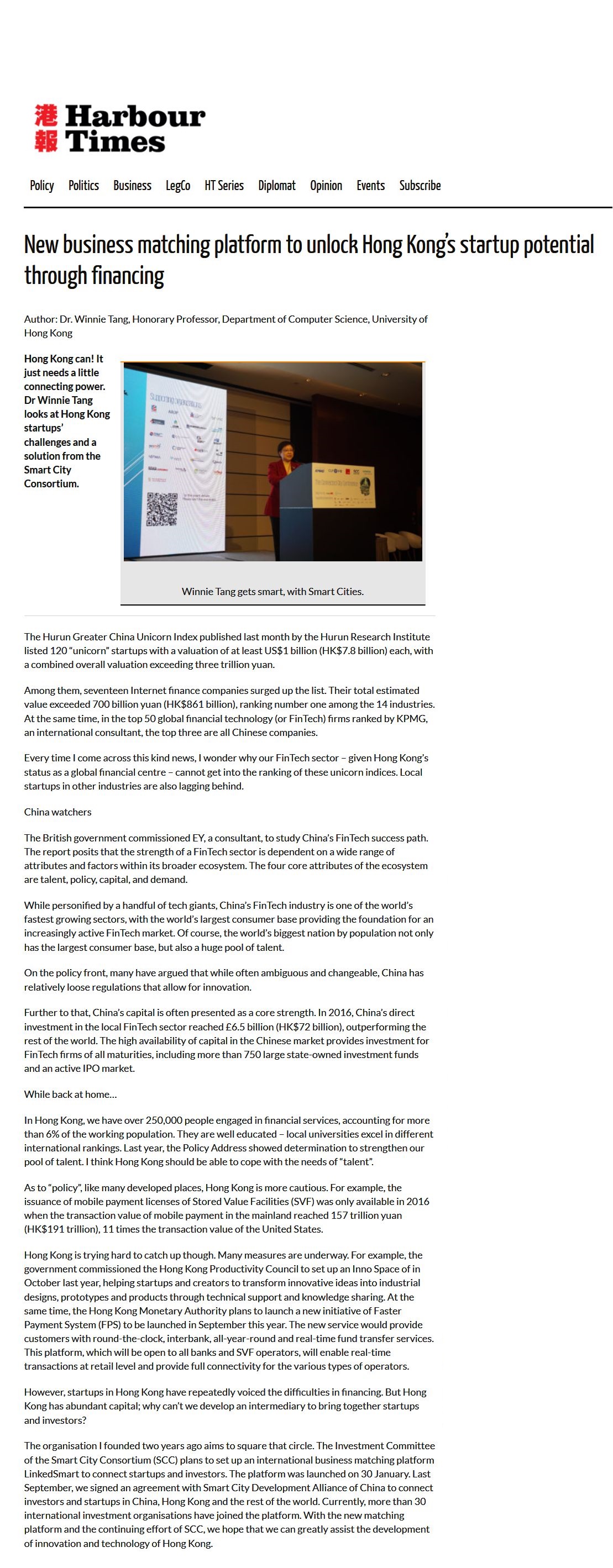網上版請按此

New business matching platform to unlock Hong Kong's startup potential through financing
The Hurun Greater China Unicorn Index published last month by the Hurun Research Institute listed 120 "unicorn" startups with a valuation of at least US$1 billion (HK$7.8 billion) each, with a combined overall valuation exceeding three trillion yuan.
Among them, seventeen Internet finance companies surged up the list. Their total estimated value exceeded 700 billion yuan (HK$861 billion), ranking number one among the 14 industries. At the same time, in the top 50 global financial technology (or FinTech) firms ranked by KPMG, an international consultant, the top three are all Chinese companies.
Every time I come across this kind news, I wonder why our FinTech sector – given Hong Kong’s status as a global financial centre – cannot get into the ranking of these unicorn indices. Local startups in other industries are also lagging behind.
China watchers
The British government commissioned EY, a consultant, to study China's FinTech success path. The report posits that the strength of a FinTech sector is dependent on a wide range of attributes and factors within its broader ecosystem. The four core attributes of the ecosystem are talent, policy, capital, and demand.
While personified by a handful of tech giants, China's FinTech industry is one of the world's fastest growing sectors, with the world's largest consumer base providing the foundation for an increasingly active FinTech market. Of course, the world's biggest nation by population not only has the largest consumer base, but also a huge pool of talent.
On the policy front, many have argued that while often ambiguous and changeable, China has relatively loose regulations that allow for innovation.
Further to that, China's capital is often presented as a core strength. In 2016, China's direct investment in the local FinTech sector reached £6.5 billion (HK$72 billion), outperforming the rest of the world. The high availability of capital in the Chinese market provides investment for FinTech firms of all maturities, including more than 750 large state-owned investment funds and an active IPO market.
While back at home...
In Hong Kong, we have over 250,000 people engaged in financial services, accounting for more than 6% of the working population. They are well educated – local universities excel in different international rankings. Last year, the Policy Address showed determination to strengthen our pool of talent. I think Hong Kong should be able to cope with the needs of "talent".
As to "policy", like many developed places, Hong Kong is more cautious. For example, the issuance of mobile payment licenses of Stored Value Facilities (SVF) was only available in 2016 when the transaction value of mobile payment in the mainland reached 157 trillion yuan (HK$191 trillion), 11 times the transaction value of the United States.
Hong Kong is trying hard to catch up though. Many measures are underway. For example, the government commissioned the Hong Kong Productivity Council to set up an Inno Space of in October last year, helping startups and creators to transform innovative ideas into industrial designs, prototypes and products through technical support and knowledge sharing. At the same time, the Hong Kong Monetary Authority plans to launch a new initiative of Faster Payment System (FPS) to be launched in September this year.The new service would provide customers with round-the-clock, interbank, all-year-round and real-time fund transfer services. This platform, which will be open to all banks and SVF operators, will enable real-time transactions at retail level and provide full connectivity for the various types of operators.
However, startups in Hong Kong have repeatedly voiced the difficulties in financing. But Hong Kong has abundant capital; why can't we develop an intermediary to bring together startups and investors?
The organisation I founded two years ago aims to square that circle. The Investment Committee of the Smart City Consortium (SCC) plans to set up an international business matching platform LinkedSmart to connect startups and investors. The platform was launched on 30 January. Last September, we signed an agreement with Smart City Development Alliance of China to connect investors and startups in China, Hong Kong and the rest of the world. Currently, more than 30 international investment organisations have joined the platform. With the new matching platform and the continuing effort of SCC, we hope that we can greatly assist the development of innovation and technology of Hong Kong.
Dr. Winnie Tang
Honorary Professor, Department of Computer Science, The University of Hong Kong